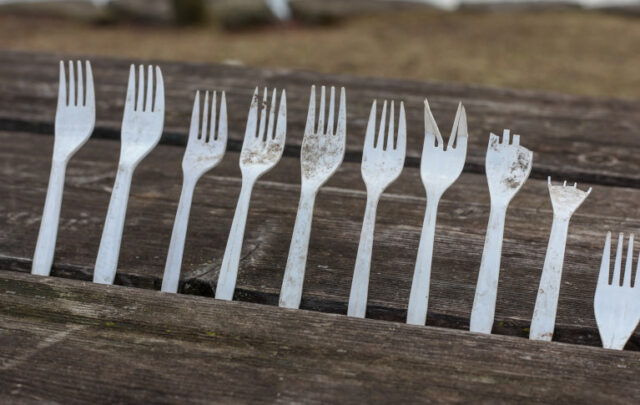NOTE: Images in this archived article have been removed.

Photo (CC BY-NC-SA): Ägidius Wellenzohn
By banning pesticides in a referendum, the community of Mals in Southern Tyrol is set to garner worldwide attention. That does not mean that the conflict is settled.
The winds of change are blowing through Mals. In September 2014, this South Tyrolean community in the Upper Venosta Valley dared rise in a democratic rebellion, holding what must be the world’s first referendum against pesticides and triggering a torrent of threats, lawsuits, acclaim, and awards. Journalists from around the world descended upon the rebel village on the green banks of the Adige River to cover the “Miracle of Mals” and its unruly, freethinking residents.
Gusts of pesticides
The wind is also the beginning of the story. On about 300 days per year, the strong katabatic “Oberwind” from snow-covered 3,000-meter peaks gusts over the Mals heathland, blowing off the pesticides that are sprayed in the region’s intensive fruit farming. For some time, farmers along the Adige have been banking on Golden Delicious apples and other quite bland-tasting money-makers.
A veritable monoculture-army of apple and cherry trees stands in rank and file along the Venosta Valley. This type of land-grabbing on the hills around Mals hardly leaves any room for organic farmers and nonconformists. One organic famer was even fined because the wind left residues of toxins on his herbs. In 2011, German toxicologist Irene Witte analysed hay samples from the region and came to the conclusion that their pesticide levels were so elevated that they ought to be disposed of as toxic waste.
A gale of outrage, a mighty storm
In the wake of these horror stories, a gale of outrage roared through the 5,000-strong community. Among those who especially fanned the anger were the Umweltschutzgruppe, an environmental protection group that was working on reviving the Venosta Valley Railway; the dairy farmers who worried that contaminated hay would result in contaminated cheese; and the Bund Alternativer Anbauer (Association of Alternative Farmers), who feared for their organic harvests. Also involved were the citizens’ initiativeAdam & Epfl (Adam & Evple), who opposed the yoke of monoculture; supporters of Mayor Ulrich Veith, who changed the community statutes in 2012 to allow referenda; as well as the promoters’ committee, with its speaker—pharmacist Johannes Fragner-Unterpertinger. The pharmacist published a “Manifesto for Health Protection” that was signed by more than 50 physicians, vets, dentists, and biologists. Since 2013, he has made multiple attempts to hold a referendum.
Following this, the brave pharmacist—a man with a handshake that could make stones crumble, who spends his nights writing novels and poems—had to contend with a good deal of direct headwind. He received threats and insults, his yard and the family tomb were vandalized, at times he even required police protection. His opponents remained anonymous, yet he knew where this mighty storm was coming from: The powerful agricultural lobby has much to lose if the example of Mals gains national and international traction.

Tailwind
But there was also some tailwind from the community, especially in the form of “Hollawint.” In 2013, identical warning letters to the editor began to pop up in the local newspaper, a Hollawint website dedicated to the topic of pesticides went online, and all the villages in the valley were suddenly plastered with banners advocating a toxin-free homeland. Some of the banners were ripped off or lit on fire, only to be replaced by “travelling banners” that seemed to wander from house to house of their own accord.
“Who are the mysterious people behind this?” the residents of Mals wondered. It’s an all-female action group consisting of architect Martina Hellrigl, organic hair stylist Beatrice Raas, educator Margit Gasser, and beekeeper Pia Oswald. They are mothers who are concerned about their children’s health, but they also had a lot of fun with their collective operations. Their events brought together the various rather male-dominated opposing groups. At one point, they presented a huge “shopping list” with foods that used to be grown in the Venosta Valley and have since fallen victim to the apple wasteland and the pesticide-ridden winds.
What motivates them? “Our swallows and larks are gone—they can’t find insects anymore,” mourns the architect about the loss of biodiversity. “This is about quality of life: a landscape where we can recharge without having to travel elsewhere,” the beekeeper explains. People from the Upper Venosta Valley “are a little different,” the educator smirks. “Fun-loving,” the hair stylist adds. “This border region between countries and cultures has always been restless, always been vulnerable to conflict,” says Thea Steiner, owner of the Panorama organic hotel. “Survival, solidarity, innovation” has thus become the motto of many Venosta Valley inhabitants.
Turning winds
In September 2014, fully 75 per cent of voters had expressed their support for a pesticide-free community. Yet proponents of pesticides found new ways to turn the wind in their favour. When the mayor wanted to anchor the people’s will in the community statutes in January 2015, many community councillors failed to show up at the session, blocking the required majority vote. Threats and lawsuits also flooded the mayor’s and the pharmacist’s mailboxes. They were accused of “fraud," wasting funds, and holding an unauthorized referendum. One gruelling, expensive lawsuit is still under way in faraway Bolzano.
But since May 10, 2015, the winds of local change have turned in favour of the environmentalists once again. Mayor Veith’s grassroots anti-pesticide approach was confirmed in local elections with an unexpectedly strong result of 72 per cent. Now he hopes for a two-thirds majority in the community council when the pesticide ban in Mals is finally up for a permanent vote.







